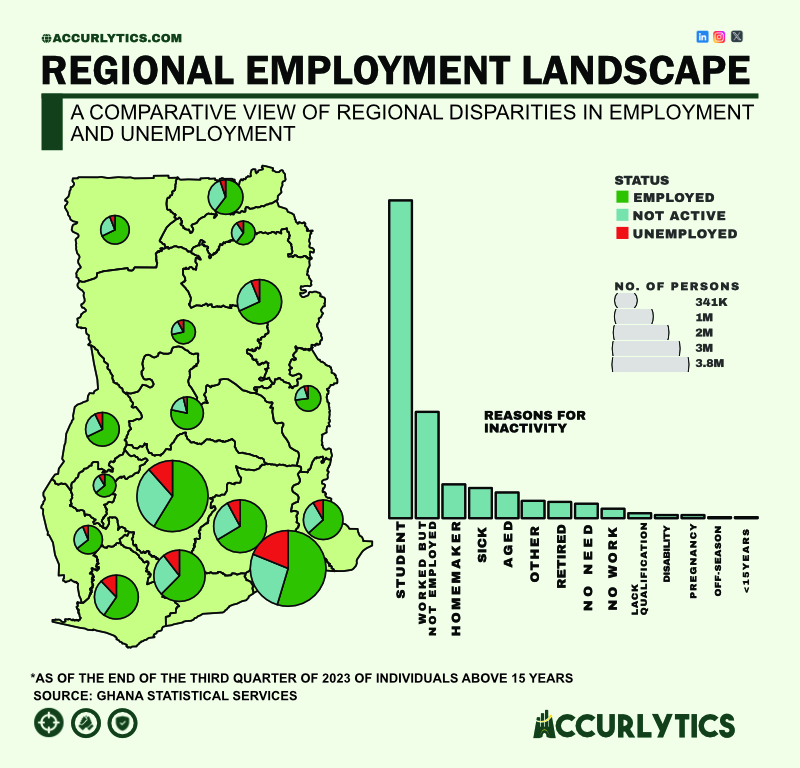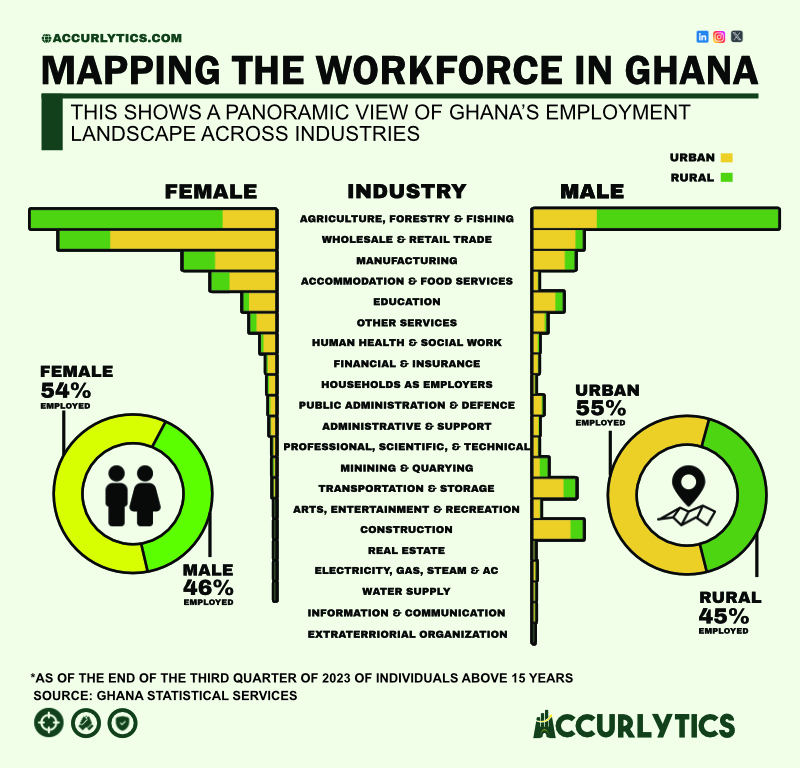Mapping The Workforce Landscape in Ghana
Employment is a crucial aspect of socio-economic development, serving as a cornerstone for individual livelihoods and national prosperity. In Ghana, like many other nations, the employment landscape is multifaceted, reflecting regional disparities and diverse industry dynamics. This data-driven analysis delves into the employment scenario in Ghana, highlighting regional variations and dominant industries based on data acquired from the Ghana Statistical Service. (2023 Quarter 3 Labour Statistics)
Regional Disparities in Employment
An analysis of employment data across Ghana's regions reveals notable disparities in the distribution of employed, unemployed, and inactive individuals. Across all regions, employed individuals constitute the majority, followed by those categorized as inactive. However, there are nuances in the proportions across regions.
In Greater Accra, a region known for its urbanization and economic vibrancy, the number of unemployed persons is nearly proportional to the inactive population. This suggests challenges in matching labor demand with the available workforce, possibly due to factors such as skills gaps or mismatches in job opportunities.
Examining the reasons for inactivity sheds light on the diverse circumstances affecting workforce participation. The primary reasons for inactivity include individuals being students, followed by those not employed but seeking work. Additionally, factors such as homemaking, sickness, and old age contribute to inactivity, reflecting broader socio-economic challenges and demographic trends.
Industries Driving Employment
Agriculture, forestry, and fishing emerge as the leading industries in terms of employing individuals across Ghana. Particularly in rural localities, these sectors play a pivotal role in sustaining livelihoods and driving economic activity. The prevalence of agriculture underscores its significance as a source of income and employment for a large segment of the population, especially in agrarian regions.
In contrast, urban localities host a diverse array of industries, reflecting the urbanization and industrialization trends shaping Ghana's economic landscape. Industries such as manufacturing, services, and commerce thrive in urban centers, offering employment opportunities across various sectors.
An analysis of employment data disaggregated by gender unveils interesting insights into the distribution of male and female workers across different sectors and regions. Contrary to conventional expectations, females emerge as the predominant workforce, reflecting their higher overall population compared to males. However, the distribution of employment varies significantly between genders across sectors and regions.
In terms of sectoral employment, males tend to dominate in industries such as public administration and defense, transportation and storage, mining and quarrying, arts entertainment and recreation, and construction. This trend can be attributed to the nature of these sectors, which often require physical strength, technical skills, or entail working in challenging environments.
Conclusion
Understanding the employment landscape of Ghana requires a nuanced examination of regional disparities and industry dynamics. While employed individuals dominate across regions, variations in unemployment rates and reasons for inactivity underscore the need for targeted interventions to enhance labor market efficiency and address socio-economic challenges.
Moreover, the dominance of agriculture in rural areas and the diversification of industries in urban centers highlight the complex interplay between geography, economic structure, and employment opportunities. By harnessing this understanding, policymakers, businesses, and civil society can work collaboratively to foster inclusive growth, create sustainable employment pathways, and improve the well-being of Ghanaian citizens across the nation.



